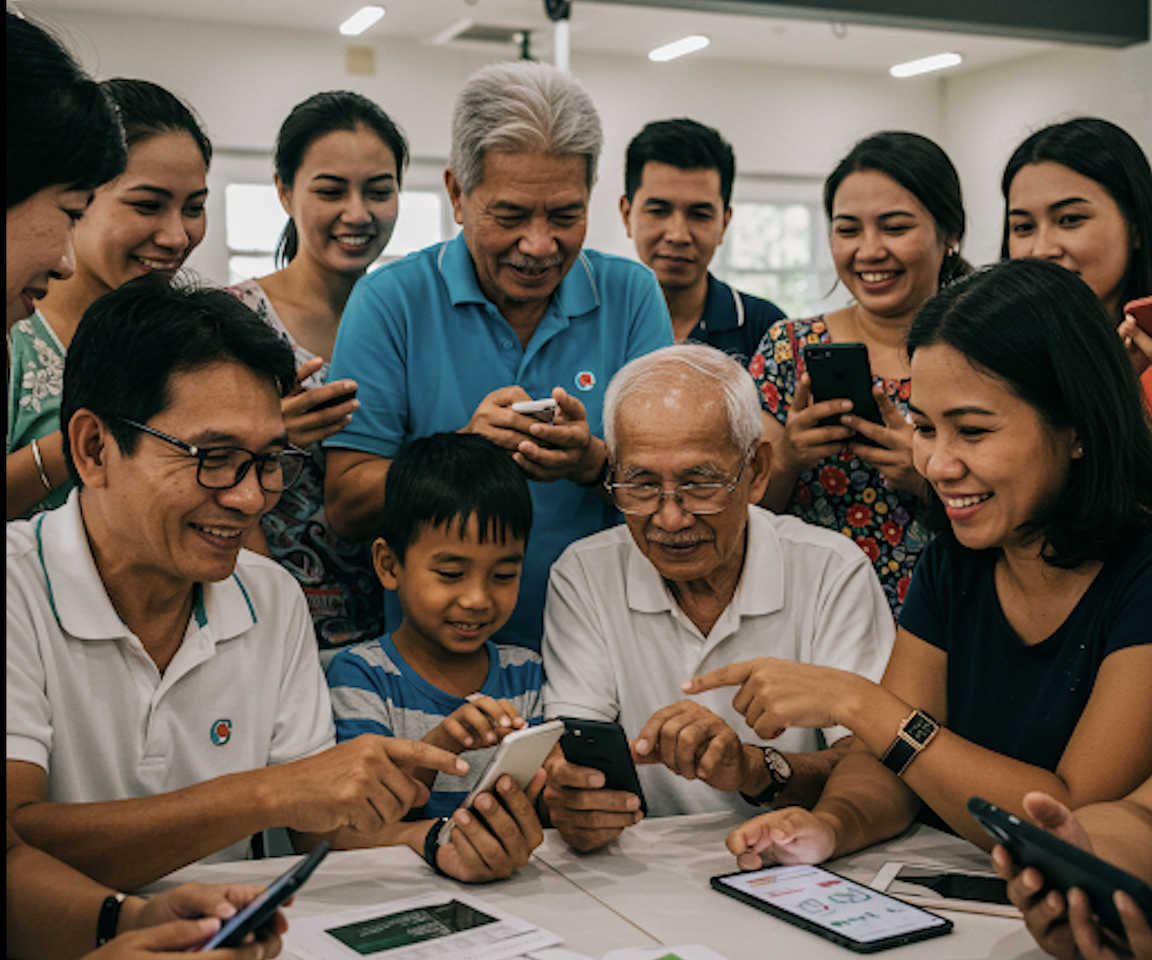Special Report by Jade Saavedra, Correspondent
The rapid proliferation of digital mobile wallets and the introduction of sophisticated Artificial Intelligence (AI) systems have undeniably ignited a transformative wave across the Philippine financial landscape.
In a nation where a significant portion of the populace remains unbanked or underinsured, these digital innovations have emerged as powerful catalysts for change, with mobile wallets notably surpassing traditional bank usage in popularity.
Yet, beneath this veneer of technological advancement lies a fundamental truth: genuine financial inclusion, the kind that truly empowers and uplifts communities, cannot be solely achieved through digital infrastructure. It demands human-led and human-centered solutions, a nuanced understanding that transcends mere algorithms and code.
AI’s promise in fintech tempered by call for human-led strategies

While AI has undeniably revolutionized the realms of fintech and digital banking, industry experts are increasingly cautioning against viewing it as a panacea, a singular solution to the complex challenges of financial inclusion.
At the recent Asian Banking & Finance and Insurance Asia Summit 2025 held in Manila, a resounding consensus emerged among industry leaders: the effective adoption of AI within the financial sector must remain firmly anchored in three pivotal pillars: fostering genuine financial inclusion, delivering exceptional customer experience, and enabling meaningful personalization.
Technology, in its essence, is merely a tool. True financial inclusion necessitates a profound comprehension of intricate human needs, interwoven with the socio-political and environmental tapestries that intricately shape these requirements.
The transformative power of AI within the financial industry is undeniable. It has ushered in an era of personalized services, dramatically enhanced customer journeys, and enabled the efficient assimilation of vast datasets to dynamically adapt platforms and systems.
“One of the most pivotal applications of AI lies in its capacity to reimagine customer experience management,” stated Clement Quek, APAC Digital Strategist at Adobe. He further emphasized the growing recognition among financial institutions of the profound power of personalization, not merely as a driver of profitability, but as a crucial instrument in bolstering the financial health, overall well-being, and financial literacy of their valued customers.
UnionBank of the Philippines (UBP) has consistently positioned itself at the vanguard of this significant digital transformation. Dennis Omila, UBP’s Chief Transformation Officer, eloquently highlighted how AI fuels a culture of continuous innovation within their organization.
“The beauty of having a robust digital platform is the ability to continuously experiment without the constant apprehension of failure,” Omila explained. “These well-designed platforms empower us to explore new possibilities in a cost-effective and significantly faster manner.”
Bridging the gap to true financial inclusion

However, as the embrace of AI becomes more widespread across the banking sector, the imperative for robust and ethical governance intensifies.
The Bangko Sentral ng Pilipinas (BSP), recognizing this critical need, is proactively formulating regulations aimed at ensuring the ethical deployment of AI, diligently managing potential biases, and upholding the paramount importance of accuracy in its application.
“The financial sector in the Philippines is generally well-prepared to embrace the AI revolution, demonstrating a commendable readiness to equip themselves with the necessary risk management tools,” affirmed Melchor Plabasan, BSP’s Senior Director for the Tech Risk and Innovation Supervision Department (TRISD).
Despite these commendable strides in technological adoption and regulatory foresight, it is crucial to acknowledge that mere access to digital financial services does not automatically equate to genuine financial inclusion.
A significant portion of the Filipino population, particularly those residing in rural and low-income areas, continues to grapple with a deep-seated lack of trust in formal financial institutions. While the advent of mobile banking has undoubtedly simplified the process of opening accounts, true financial empowerment transcends the confines of a mobile application and its underlying digital systems.
“At the end of the day, we must remember that digital technology, while a powerful enabler, is not the ultimate solution,” cautioned Lito Villanueva, Executive Vice President and Chief Innovation & Inclusion Officer at RCBC.
RCBC’s ATMGo prioritizes human connection for genuine financial inclusion

Villanueva pointed to RCBC’s pioneering ATMGo initiative, the Philippines’ first “Kapitbahay ATM,” as a compelling example of inclusive banking in action. This innovative program strategically partners with local sari-sari stores and small businesses in underserved rural areas to deliver essential banking services through a human touchpoint.
RCBC’s initiative effectively bridges the digital divide by connecting local entrepreneurs with traditional banking services, thereby creating tangible accessibility and unparalleled convenience for customers within their own communities. “Our goal is to break down the barriers that have traditionally hindered MSMEs from fully participating in the digital economy,” stated RCBC in a press release on its website.
ATMGo empowers customers to perform a range of crucial transactions, including cash-in, fund transfers, E-Load purchases, and bill payments, all within the familiar and trusted environment of their local neighborhood store. RCBC’s vision extends beyond mere service provision; it aims to actively support local businesses while delivering essential financial services to previously underserved populations.
This groundbreaking approach underscores a fundamental truth that must guide the evolution of digital banking: accessibility, while critical, must be intrinsically linked with genuine human connection. Trust, experts vehemently argue, forms the very bedrock upon which successful and sustainable banking relationships are built.
“We firmly believe that because banking is fundamentally a trust-based industry, the most crucial element of fostering that trust cannot be solely relegated to digital interfaces,” emphasized Albert Tinio, co-CEO of GoTyme Bank.
Digital banks: Building trust through tailored services

Meanwhile, emerging digital banks are increasingly gaining traction by prioritizing the cultivation of genuine relationships with their customers, rather than solely focusing on the sophistication of their technological systems. This includes a strategic emphasis on creating customized financial products that genuinely reflect the diverse real-life needs and aspirations of their clientele.
“The level of trust a customer has in a financial institution rises organically over time as they perceive that the products and services offered are thoughtfully prioritized and tailored to their individual circumstances,” shared Kalidas Ghose, Chairman of UNO Digital Bank. This human-centric approach becomes particularly crucial when considering the unique nuances of the Filipino consumer and their specific financial needs.
A comprehensive study conducted by the Boston Consulting Group (BCG) revealed that the paramount financial goal for most Filipinos is achieving security during health emergencies, closely followed by the aspirations of home ownership, diligent debt repayment, and the desire for travel experiences.
These are not abstract or generic needs; they are deeply personal and require empathetic and inclusive financial guidance that resonates with their lived realities. While AI and sophisticated digital tools can undoubtedly augment and enhance this guidance, the fundamental leadership must stem from human empathy, a strong ethical conscience, and genuine compassion.
The trajectory of the fintech industry in the Philippines clearly indicates that AI will continue to play an increasingly significant role in shaping the future of digital finance. However, it is equally clear that technology alone cannot be the sole driver.
The most impactful and sustainable strategies will be those that seamlessly integrate cutting-edge digital innovation with authentic human connection. To truly succeed in an increasingly saturated market, financial institutions must strategically invest not only in robust digital infrastructure but also in tangible offline systems and meaningful community-based outreach initiatives.
Whether through the establishment of accessible physical branches, the organization of informative pop-up financial education events within communities, or the strategic deployment of embedded human agents within underserved areas, financial services must proactively meet people where they are, rather than solely relying on the reach of internet connectivity.
Beyond the algorithm: Human-centered approach key to true financial inclusion

Digital banking has undeniably achieved remarkable progress in the Philippines, and the burgeoning fintech landscape stands as a testament to its potential in driving financial inclusion and empowerment across the nation.
However, the ultimate goal of achieving true and equitable financial inclusion necessitates a paradigm shift – a move beyond the limitations of the algorithm. AI should be embraced as a powerful means to an end, not as the ultimate mission itself.
By diligently embedding principles of trust, empathy, and genuine accessibility into every facet of their innovation, the fintech industry in the Philippines has the potential to achieve far more than simply expanding access to financial services; it has the profound capacity to truly empower lives and build a more equitable financial future for all.
As the Bangko Sentral ng Pilipinas and the major players within the industry continue to champion a human-centered approach to AI adoption, the future of finance in the Philippines holds immense promise, not solely because of the transformative power of technology, but because of the dedicated individuals who are committed to building it the right way – with people at its heart.








